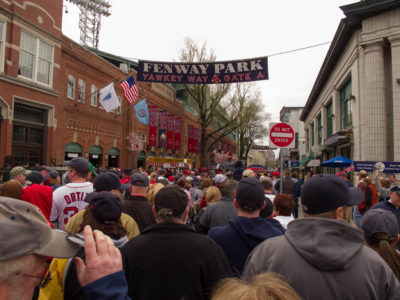
On Tuesday night, I walked across the David Ortiz Bridge, through a packed Yawkey Way, and into beautiful Fenway Park. I enjoyed a ball game where the Boston Red Sox won easily, 11-1. As the Sox trounced the Oakland Athletics, I looked out at some of Fenway’s most prominent features: the Green Monster, Pesky’s Pole and the John Hancock sign.
Names are everywhere.
But not just anyone can have a street, bridge or foul pole named in his or her honor. What does it take to receive such a distinction? This is not a question we ask all that often. How much does it really matter who gets the street sign, anyway?
Well, in today’s political climate, it matters. A lot.
Following the riots and violence in Charlottesville, Virginia last month, conversations about race consumed Washington and the entire country. A national dialogue ensued over the controversy of Confederate statues and monuments — should we continue to commemorate our history, no matter how ugly it may be?
As often happens nowadays, the world of sports remains incapable of steering clear of national political debates. Sports and politics appear more intertwined than ever before and nothing suggests an end to that trend anytime soon.
Following the Confederate statue controversy, Red Sox owner John Henry revealed that the Sox have been holding a similar internal debate for years: what to do about Yawkey Way. Henry said he is “haunted” by his team’s racist history.
Tom Yawkey purchased the Red Sox in 1933 and owned the franchise for 43 seasons, longer than anyone else. Yawkey was a popular figure in Boston and around baseball, and he played a crucial role in the development and growth of his team. His wife Jean also made sizeable contributions to Boston’s Dana-Farber Cancer Institute. In 1977, a year after Yawkey’s death, the section of Jersey Street where Fenway is located was renamed Yawkey Way. Three years later, Yawkey was inducted into the National Baseball Hall of Fame.
Given his resume, it makes perfect sense that the Red Sox and the City of Boston honored Yawkey. But sadly, like many parts of Boston’s history, there is a much darker side as well.
Put simply, Tom Yawkey was a racist. Big time.
The Red Sox were the last team in Major League Baseball to integrate. Pumpsie Green, the first African-American player to suit up for the Sox, debuted in 1959, 12 years after Jackie Robinson broke the color barrier in Brooklyn.
There are no excuses here. Yawkey was a bigot and he made his identity painfully clear in the way he ran his team.
But maybe Yawkey doesn’t deserve it after all.
Boston has a very complicated history, one that is riddled with institutional and implicit racism. Just this season, Baltimore Orioles outfielder Adam Jones fell victim to the insensitivity and intolerance that still persists in Boston. We clearly have a long way to go.
Confronting the troubling past of the franchise and its longest-tenured owner, though not a comprehensive solution by any means, is certainly an important and admirable step. It’s long overdue.
Sure, Yawkey Way is a beloved staple of Boston. It oozes history and emits nostalgia on par with the Freedom Trail and Faneuil Hall. But it’s time to move past the racist history of Yawkey and find a more deserving figure to honor. The street has only been named for 40 years while the team has been around since 1901. It’s not permanently etched into the fabric of the city or the team; it’s just a street sign.
The question is, if not Yawkey Way then what? Henry floated the idea of naming the street after Ortiz. Others have mentioned Pedro Martínez, Carl Yastrzemski or even Jackie Robinson as possible replacements.
Personally, I’m not too particular. Ortiz has a bridge and street near Fenway, and a gate at the Boston Logan International Airport. I love Big Papi and would not oppose walking down David Ortiz Way to enter Fenway, but I think we should spread the love.
Perhaps Yaz Drive? Wally Way? Ted Williams Avenue? The possibilities abound. As long as we distance ourselves from the bigoted past of Yawkey, crucial progress will be made. Call it Trot Nixon Street for all I care.
Changing the lettering on a street sign cannot erase years of discrimination and pain. However, when we choose to name landmarks after people, we signal that the honoree is deserving of our recognition. They represent us.
So while changing the name of Yawkey Way won’t atone for the bitter history of Boston and the Red Sox, it’s a powerful message we can send about our current and future identity: that’s not who we are anymore.
Better late than never, right?
CORRECTION: Due to an editing error, a previous version of this article stated Pumpsie Green debuted in 1959, 14 years after Jackie Robinson broke the color barrier in Brooklyn, rather than 14 years after.


Thoughts on The Yawkey Center for Student Services?